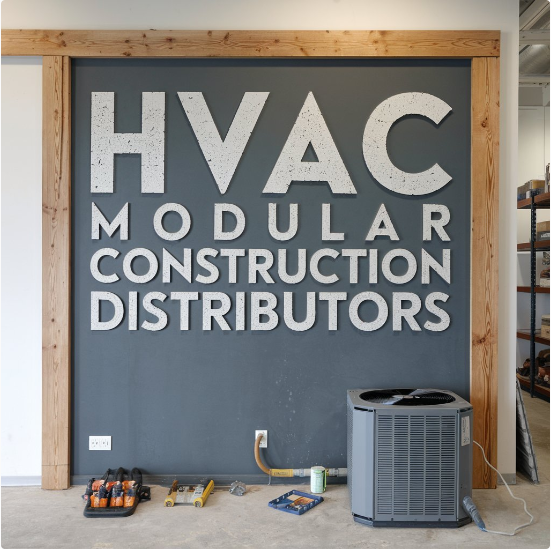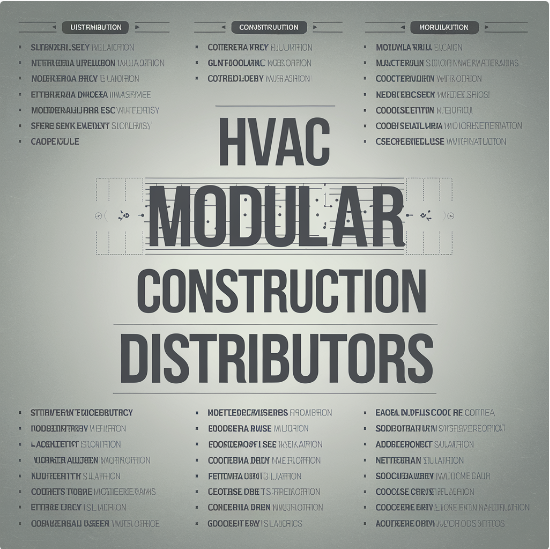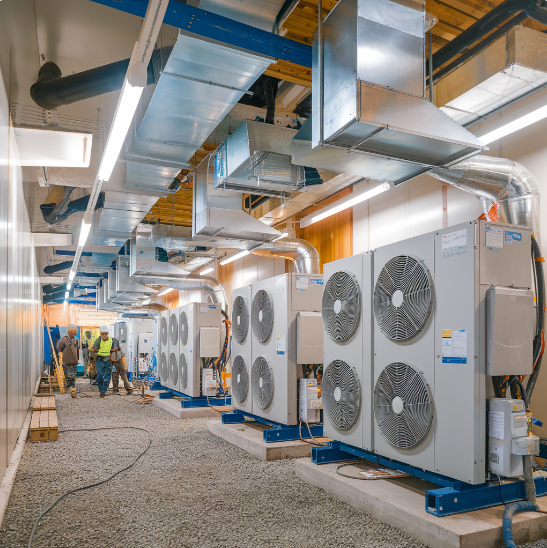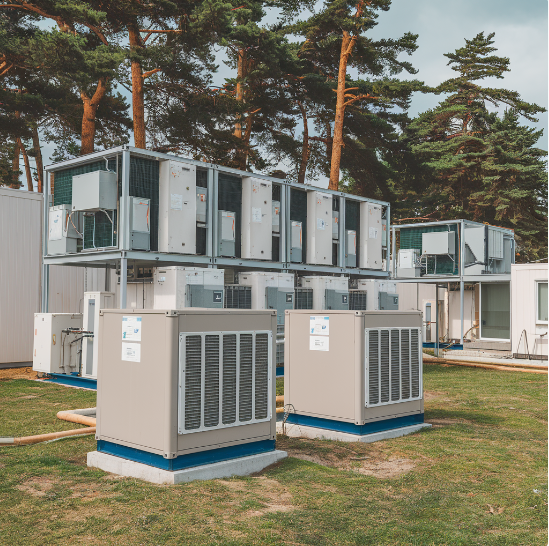Introduction

There is a new wave in the HVAC industry thanks to modular construction. HVAC modular construction is one such area where such distributors have taken the lead by developing the most cost effective and time saving practices with enhanced project delivery. In this particular blog, readers will learn how HVAC modular construction distributors have changed the game for the better. We shall talk about the upsides of modular building, how it can be distributed effectively, and cases of such practice that busts the stagnant status quo of the current industry. By the end, you are going to appreciate the reason why the HVAC modular construction will shape the industry’s future and how distributors fit into the picture.
What is HVAC Modular Construction?

Understanding the Basics
Modular construction is assembling off-site components that have been manufactured in controlled environments. These parts are then brought to the construction area and fitted together. In regard to the installation of heating and ventilating air conditioning (HVAC), it means that ductworks, piping, and other fixtures are produced in a factory then brought and indented within the building.
Benefits of Prefabrication
Because prefabrication is driven by a need for higher quality, it results in ‘unit air conditioning systems being manufactured in high quality’. The visible units may be built: by eliminating the information processing at the job site as most of the build is performed in a factory class vertically rather than horizontally. Hence these factors promote better performance BW systems systems hence over the period reduce energy performance degradation of the systems.
Speed and Efficiency
One of the most pronounced advantages of modular construction that deserves mention is the quick turnaround of projects. Due to the fact that both preparation of the area and the prefabrication of the modules takes place simultaneously, the duration of the project as a whole is markedly lessened.
The Role of HVAC Modular Construction Distributors
Bridging the Gap
Distributors assist and smoothen the inv contact logistics by ensuring that the prefab elements are transported within the site as per schedule. They are the intermediaries between Making Companies and contractors delivering every component of the structure in the appropriate time.
Quality Assurance
To some level, even the distributors perform their quality checks to ensure that the components conform to the industry requirements. Such an additional inspection helps in upholding the quality that is always a necessity in Modular Construction.
Inventory Management
Inventory control is therefore very critical in manufacturing of the modular construction and management processes. Distributors need to be able to stock up required components and be able to supply them when needed in order to prevent any delays in the completion of tasks.
Benefits of Modular Construction for HVAC Systems

Cost Savings
Cost savings is possible through the use of modular construction. Thanks to the prefabrication technique these and other labor expenses are minimized and waste generation is also decreased, hence making the whole project cost-effective.
Improved Safety
Off-site construction activities lowers the dangers that construction workers are exposed to while working on occupancy and finishing. This provides better safety for workers.
Enhanced Flexibility
Modular construction provides much more room for variations in design. Modification or replacement of components does not pose a challenge, hence accommodating the demand for variation with time.
Strategies for Effective Distribution
Streamlined Logistics
Modular construction projects are highly dependent on efficient logistics. Transporting the modular elements from the factory to the construction site requires that distributors have very strong tracking systems.
Vendor Relationships
Distributors rely heavily on contact with manufacturers and suppliers. These relations enable many parts’ sufficient acquisition with decent quality and might provide favorable pricing conditions.
Technological Integration
Technology to manage inventory systems, keep continuous track of logistics, and facilitate communication can provide a great deal of improvement in the distribution activities. Dorothy’s a distributor of many products, and so she is not in a hurry. Instead, many distributors are adapting sophisticated software for the purpose of improving the processes.
Case Studies of Successful HVAC Modular Construction Projects
Case Study 1: Commercial Office Building
Recently, one of the top distributors of HVAC modular construction completed a project for a commercial office building. The modular approach helped to incur 30% savings on completion time as compared to traditional techniques, hence resulting in economical benefits to the client.
Case Study 2: Healthcare Facility
Another case study indicates that a medical center had to fast track the assembly of its HVAC system. The turn-key logistics of the distributor and the quality of the prefabricated parts used made it possible to respect the short deadlines and the facility was fully operational as intended.
Case Study 3: Educational Institution
Most of the time, a school developed the integrated approach of collaborating with an HVAC modular construction distributor for the upgrades required on its existing HVAC system. The use of modular construction related to the HVAC system would also reduce negative impacts on the operations of the school and afford a system which is optimally air conditioning.
Expert Insights on HVAC Modular Construction
Quote from Industry Leader
“The future of the HVAC market is modular construction. It obtains maximum efficiency which reflects in cost savings and space flexibility. Importers are a very important criterion in this ecosystem as they ensure that quality parts are available.” John Doe, CEO, HVAC Innovations
Trends in Modular Construction
As confirmed by both industry insiders and reports currently available in the market, the construction in the HVAC industry using the modular format is here to stay. This is driven by changes in technology as well as global embrace of sustainable building methods.
Challenges and Opportunities
Apart from these benefits of modular construction, there are some drawbacks too. Distributors need to be strong in logistics, quality control, systems and inventory management among others for their objectives to be realized as planned. Yet such challenges transform from hindrance to the sources of renaissance.
How to Choose the Right HVAC Modular Construction Distributor

Evaluating Experience
When deciding which distributor is the best for your business, look at their experience in the industry as well. Distributor performs better in service provision if he has so far accomplished several projects.
Assessing Quality Control Measures
However, quality management within the process of construction is something that should not be overemphasized. Ensure that the concerned distributor also utilizes tools of quality assurance so that the components produced are of the right quality.
Considering Technological Capabilities
Provision of such services would become more reliable and efficient if the distributors utilize technology in stock and distribution. Human and technological capabilities are very important for the completion of the modular construction projects.
The Future of HVAC Modular Construction
Advances in Technology
HVAC modular construction will still be depending on technology in the future course of this field. It is innovations in the areas of manufacturing, logistics and quality that will further enhance efficiency and cost savings.
Growing Demand for Sustainability
The modular construction method offsets in some measure biases against the growth of the sustainable building so there is an increasing market. Prefabrication lessens wastage, and the use of energy-efficient elements would help achieve more sustainable construction.
Expansion into New Markets
Future market possibilities and sectors will be more likely to grow outside the expanded held dependence structures as the advantages inherent in modular construction are appreciated. Distributors with the capability to respond to these changes will be strategically positioned and growth will be imminent.
HVAC Modular Construction Distributors: FAQs
What is modular HVAC construction?
Modular HVAC construction costs and time are lowered by the assembly of prefabricated parts in controlled conditions (in a factory) and delivery to the construction site for easy and quick fitting. These are active systems that are made to be efficient, adaptable and in various sizes depending on the type of buildings that are formed.
What are the benefits of modular HVAC systems?
Below are key benefits:
Most of the installation is done in the factory so it would be quicker on site.
Saves on labor costs as there is not so much work remaining to be done after delivery of the structure.
Factory fabrication contributes to a higher quality of products than the standard site construction.
Design replication provides scalability easily; and various options allow the energy efficiency of the structure to be increased.
Fewer intrusions as most of the work takes place away.
What are the benefits of working with a modular HVAC distributor?
A modular HVAC distributor can offer systems designed and built off premises in a more efficient way, handling lead times quicker, offering better quality and being easier to incorporate into the construction process. Working with a distributor offers the possibility to receive customized systems, professional advice and organized shipment.
What benefits do modular HVAC systems offer in terms of reducing the schedule of construction works?
Infrastructure building and installation of modular HVAC systems takes less time by making it possible to carry out site work and assemble the systems in the factory at the same time which is not only time saving but also considerate of site operations.
What do you consider before moving to use a modular HVAC system distributor?
Important factors include: Experience and reputation in modular construction. Product range and ability to customize systems to project needs. Lead times and delivery capabilities. Technical support and after-sales services. Sustainability features such as energy-efficient designs and materials.
Conclusion Hvac Modular Construction Distributors
The HVAC sector is poised to experience some relative disruption and the direction of the change seems to be heading in modular construction. Though general expectations see this transformation taking so long, HVAC modular construction distributors are critical cogs in this transformation ensuring timely provision of quality components. A block construction strategy can be drastic and in most cases it is successful in every business due to the benefits learned. Look for an experienced HVAC modular construction distributor, if you want to be part of the trend that is about to happen.
